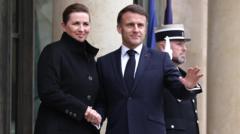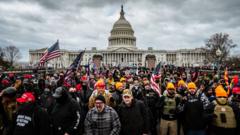As the new Trump administration emerges, UK PM Keir Starmer faces a strategic dilemma in forging trade relationships with the U.S. or re-establishing ties with Europe, complicating Brexit negotiations.
Britain at a Crossroads: Balancing Ties with Trump and Europe

Britain at a Crossroads: Balancing Ties with Trump and Europe
PM Keir Starmer navigates challenges in balancing strong relations with the U.S. and Europe post-Trump's election victory.
In a symbolic gesture aimed at rekindling relations with Europe, British Prime Minister Keir Starmer joined French President Emmanuel Macron in Paris last week to commemorate Armistice Day. Starmer's participation marks a historic moment as the first British leader to attend the ceremony since Winston Churchill in 1944. This visit reflects the Labour government's intent to revitalize ties with the European Union amidst global political shifts.
However, the recent election of Donald J. Trump, whose administration is reaffirmed as a staunch ally of Brexit, complicates Starmer's agenda. The Labour leader has positioned this as a pivotal moment to “turn a corner on Brexit,” viewing it as a “once-in-a-generation opportunity” to strengthen economic and political relationships with Europe. Nonetheless, this rapprochement faces scrutiny in light of Trump's history of opposition to the EU.
The discourse surrounding Britain's trade strategies is increasingly polarized. Diplomats have cautioned that fortifying trade relations with Europe may jeopardize London's connection with the upcoming U.S. administration. Stephen Moore, a senior advisor for Trump's campaign, underscored this perspective, urging a binary decision for the British public: "Do you want to be more like Europe or the U.S.?"
With potential economic alliances hanging in the balance, Starmer's Labour government is pressed to navigate a complex landscape where the path to improved European ties might run counter to securing a favorable free-trade agreement with the U.S. As the political clock ticks down to implementation, the challenge intensifies for the UK leadership to find a sustainable approach that enhances both EU and U.S. relations without compromising national interests.
However, the recent election of Donald J. Trump, whose administration is reaffirmed as a staunch ally of Brexit, complicates Starmer's agenda. The Labour leader has positioned this as a pivotal moment to “turn a corner on Brexit,” viewing it as a “once-in-a-generation opportunity” to strengthen economic and political relationships with Europe. Nonetheless, this rapprochement faces scrutiny in light of Trump's history of opposition to the EU.
The discourse surrounding Britain's trade strategies is increasingly polarized. Diplomats have cautioned that fortifying trade relations with Europe may jeopardize London's connection with the upcoming U.S. administration. Stephen Moore, a senior advisor for Trump's campaign, underscored this perspective, urging a binary decision for the British public: "Do you want to be more like Europe or the U.S.?"
With potential economic alliances hanging in the balance, Starmer's Labour government is pressed to navigate a complex landscape where the path to improved European ties might run counter to securing a favorable free-trade agreement with the U.S. As the political clock ticks down to implementation, the challenge intensifies for the UK leadership to find a sustainable approach that enhances both EU and U.S. relations without compromising national interests.





















